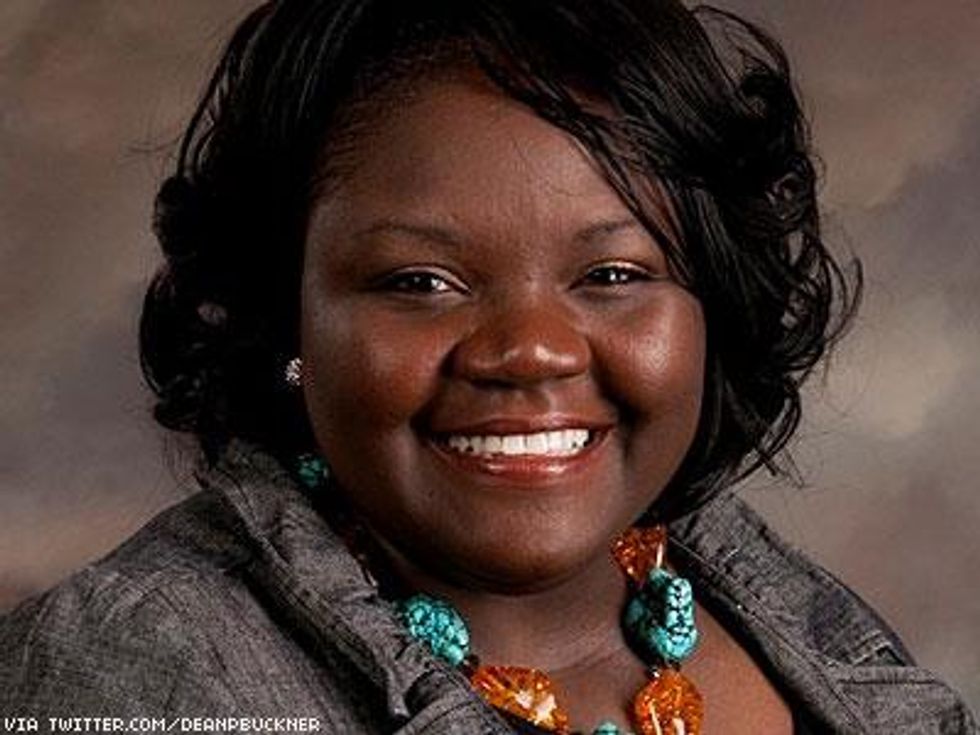On a Tuesday in August, Georgia Southern University issued an alarming “health alert” to its students. A “dominant” black man was “intentionally and knowingly” transmitting HIV. School officials warned the press, too. But weeks later, amid denials by state health officials that they authorized or distributed the alert, the school has quietly removed it from its website. A lot of people are demanding to know why it was posted in the first place.
“This ‘health alert’ has all the subtlety of a campfire story about an escaped ax murderer,” says Georgia-based blogger and activist Mark King. “Those most likely to infect us are people we know and trust, not the viral-wielding thugs as described by campus police.”
Indeed, in the weeks since the warning, police have so far filed no criminal charges, identified no suspects, and provided no public substantiation that anything in the alert was true. Still, the initial warning left little to the imagination:
"The Department of Public Safety has been informed of a potential danger in the form of an HIV positive individual who may be knowingly and intentionally infecting his sexual partners. The subject is reportedly an attractive, well-kempt, well-dressed African American male who is in his mid-thirties, but could appear to be in his mid-twenties. He may portray himself as a world traveler who has lived in New York City, Philadelphia and Atlanta. He may also report living in smaller towns like Savannah, Statesboro, Augusta, Macon and Vidalia. He is masculine and dominant, has tattoos and sometimes wears glasses and/or facial hair.While he has been known to target men, the subject presents a risk to anyone with whom he has intimate contact. He has been known to approach a victim, gain his trust and move into the victim’s home. He may tell the victim he has a recording studio and can assist with a recording career. He has also been known to claim that he works as an HIV counselor/assistant."
GSU’s dean of students, Patrice Buckner-Jackson, issued a press statement in conjunction with the alert: "Georgia Southern University received an anonymous report of a potential health danger to our students that we determined to be a credible threat. The University is taking action to issue a warning to our students about the potential threat from an HIV infected male. At Georgia Southern, we strive to teach our students to make informed decisions. The safety and well-being of our students remain our top priorities."
University spokesman Casey Jones declined to answer any questions about the alert, including when and why it was removed from the university’s website. Jones also declined to answer questions about how the university determined the anonymous report was “a credible threat.”
A spokesman for Georgia’s Department of Public Health says it provided technical assistance to GSU for testing and access to treatment for new infections but that the department was not involved in the ongoing criminal investigation and had nothing to do with the health alert.
“I underscore that the alert you mention was not authored or distributed by DPH,” emailed Ryan Deal, communications director for the Department. “DPH has not issued an alert of this nature.”
National and local activists have condemned the alert as stigmatizing against those living with HIV. Terrence Moore, director of policy and health equity with the National Association of State and Territorial AIDS Directors – a national membership organization of the leading health authorities on HIV in the U.S. – slammed the alert in a statement released to The American Independent.
“While we are glad that the University has since removed the health threat from the website, the message that it shared was stigmatizing toward people living with HIV and populations disproportionately affected by HIV, especially Black gay men,” Moore wrote. “We understand that the University feels the need to maintain the health and safety of its students; however, this health alert did not follow a public health approach to HIV prevention as recommended by the National HIV/AIDS Strategy (NHAS), whose vision ends with ‘free of stigma and discrimination.’ This is evident by fact that the Georgia Department of Public Health was not consulted before this alert, which is very disconcerting.”
 At left: GSU’s dean of students, Patrice Buckner-Jackson
At left: GSU’s dean of students, Patrice Buckner-Jackson
NASTAD was not alone in condemning the alert. Scott Schoettes, HIV project director at Lambda Legal, also criticized the alert.
“Where is the evidence that this individual is ‘intentionally’ infecting his sexual partners? Throwing words like this around devoid of any context or specifics is very dangerous indeed,” Schoettes said in an email. “And what, exactly, is the take-away from this (inaccurate) statement supposed to be: ‘the subject presents a risk to anyone with whom he has intimate contact.’? All I hear is ‘avoid people living with HIV at all costs’ and ‘if someone with whom you are considering being ‘intimate’ tells you s/he is HIV-positive–the only sensible response is to reject them and run away.’ With messages like this coming from public officials, is it any wonder that people living with HIV are reluctant to be fully forthright regarding their status?”
The executive director of Sero Project, a national organization fighting to repeal HIV-specific laws in the United States, is raising additional concerns.
“It concerns me that they have provided identifying details about an individual, who has now been essentially tried and convicted in the court of public opinion without his accuser(s) even being identified, let alone any evidence presented or subjected to scrutiny,” said Sean Strub in an email. “If the person is truly intentionally trying to harm others, then the school should have turned the matter over to law enforcement authorities. Students can be reminded of the importance of protecting themselves in sexual interactions without demonizing an individual without proof or due process. This kind of ‘health alert’ reinforces the idea that the risk of transmission comes from having sex with ‘the wrong person’ rather than having unprotected sex. It assigns the responsibility, blame and risk entirely to this accused person, rather than those who choose to have unprotected sex.”
Thirty-two states – including Georgia – and two territories now have HIV-specific criminal laws. They have faced increasing scrutiny in the past five years because most do not require that a person deliberately infected another in order to be charged. The laws sometimes stipulate that the use of condoms is not a legal defense. None of the laws require transmission of the virus in order to prosecute an accused. The laws generally require only that a person expose another person to the infection.
A recent study from Ottawa Canada found that high-profile criminal prosecutions of people living with HIV for failing to disclose their status resulted in a minority of high-risk men who have sex with men refusing to get tested for HIV or to discuss HIV risk with medical providers. Other studies have found that a person infected with HIV who does not know of the infection is 3.5 times more likely to transmit the infection than a person who is aware of their infection. Additionally, recent studies have shown that successful treatment with HIV medications can decrease the chance of transmission by 96 percent – something Deal at the Department of Public Health emphasizes.
“I mentioned previously our adoption of a ‘treatment as prevention’ model and its importance to DPH and to Georgia. DPH and our [non-governmental organization] partners cannot achieve the intended result – an end to HIV/AIDS – with stigma remaining an obstacle; that is our daily reality,” Deal wrote. “Because stigma associated with HIV/AIDS guides our work continuously, we are monitoring the situation at Georgia Southern University. DPH is not a law enforcement agency and is not charged with protecting the public in the same fashion as law enforcement, and DPH is not positioned to speculate on the appropriateness of such an ‘alert.’”
The worst part, says King, who runs the blog My Fabulous Disease exploring his life with HIV, is the message the alert sent to the public at large. “The ignorance in this alert would be hilarious if it weren’t actually being distributed to every student on their campus, which means the university has now willfully spread HIV stigma, ignorance, and a very false sense of what and whom a sexually active young person should be cautious about.”
HIV Plus magazine partnered with The American Independent to bring you this story. The American Independent is a progressive nonprofit news organization committed to impact journalism.

 At left: GSU’s dean of students, Patrice Buckner-Jackson
At left: GSU’s dean of students, Patrice Buckner-Jackson




































































